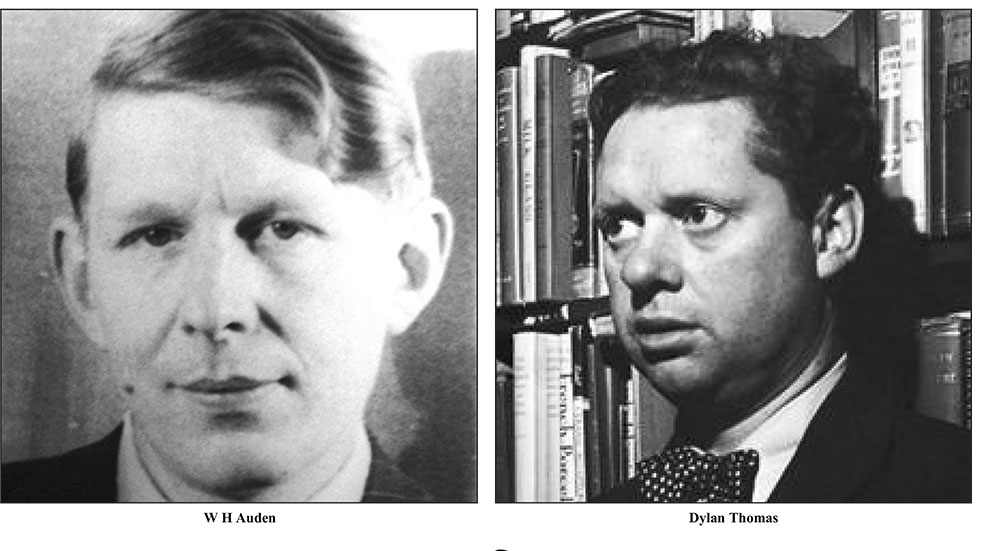
The hand that signed the paper felled a city;
Five sovereign fingers taxed the breath,
Doubled the globe of dead and halved a country;
These five kings did a king to death.
The mighty hand leads to a sloping shoulder,
The finger joints are cramped with chalk;
A goose’s quill has put an end to murder
That put an end to talk.
The hand that signed the treaty bred a fever,
And famine grew, and locusts came;
Great is the hand that holds dominion over
Man by a scribbled name.
The five kings count the dead but do not soften
The crusted wound nor pat the brow;
A hand rules pity as a hand rules heaven.
Hands have no tears to flow.
Dylan Thomas
The Embassy
As evening fell, the day’s oppression lifted
Far peaks came into focus; it had rained.
Across wide fields and cultured flowers drifted
The conversation of the highly trained.
Two gardeners watched them pass, and priced their shoes;
A chauffeur waited, reading in the drive
For them to finish their exchange of views;
It seemed a picture of the private life.
Far off, no matter what good they intended,
The armies waited for a verbal error
With all the instruments for causing pain.
And on the issue of their charm depended
A land laid waste, with all its young men slain,
Its women weeping, and its towns in terror.
W H Auden
Here are two poems that reflect the mood of the world at this time. They were written in the middle twentieth century and talk about war at a time when war seized the consciousness of the world. Today the world is plunged into an atmosphere charged with tension and horror as a result of war and related conflicts. There are troubling insurrections in different regions led by Russia’s invasion of Ukraine. Territorial occupation is at the centre of horrific threats of genocide in Gaza to add to hostilities that continue elsewhere in the Middle East.
In the South American region, Guyana will pay more attention because it is directly affected by the rising threats from Venezuela in its persistent claim of Guyana’s territory which has recently gained some heat. Activities across the border and in Caracas have grown from disregard of legitimate proceedings in the ICJ, defiance of the court’s ruling of December 1, and other diplomatically established principles of international law, to sabre rattling at the border and a national referendum. Guyana remains on high alert particularly because Venezuelans were asked by their government to vote in support of illegal invasion of Guyanese territory and Caracas has hyped up its warlike rhetoric.
The poems resist such bellicose acts and dramatise the horrors of war and the extent of human suffering that it brings. They focus on the inhuman distance between those who make the decisions and give the orders for warfare and the people on the ground who experience the destruction and terror.
“The Hand That Signed The Paper” is by one of the outstanding talents in English Literature, Dylan Thomas, acclaimed as a significant force in modern poetry. He joins others like W H Auden in offering a resistance to trends of fascism and totalitarianism developing in Europe and elsewhere in the years leading up to World War II.
“The Hand That Signed The Paper” conjures up a dictatorial powerhouse who by simply signing a paper brings on the outbreak of war, the invasion of another country or the assassination of a king. It is “a hand”, not an identified person, but this anonymity suggests more. It suggests the absence of feeling, the absence of humanity.
Auden’s “The Embassy” is also known as “Sonnet from China” because of where and when it was written. Here the setting is at an embassy or an ambassador’s residence in the luxurious suburbs of a city. The highly cultured, serene and civilised surroundings stand in total and ironic opposition to the horrendous destabilisation, human suffering, waste and destruction that take place “far off” at the scene of battle. The warfare that causes all of this can be set off by the slightest breakdown in negotiations between diplomats, “the highly trained”, impeccably cultured men. The poem thrives on understatement and irony.
One does not expect this kind of outcome in today’s South America or the Caribbean. But the mandate that Venezuela sought from its people has consequences that indicate recklessness. Against the backdrop of insurrections in Russia, Israel or elsewhere, a quiet, stable region finds itself in tension preparing for unlikely military action. The poems stand as reminders and grim reflections of what remains possible, threatened by these acts of warfare around the world.






